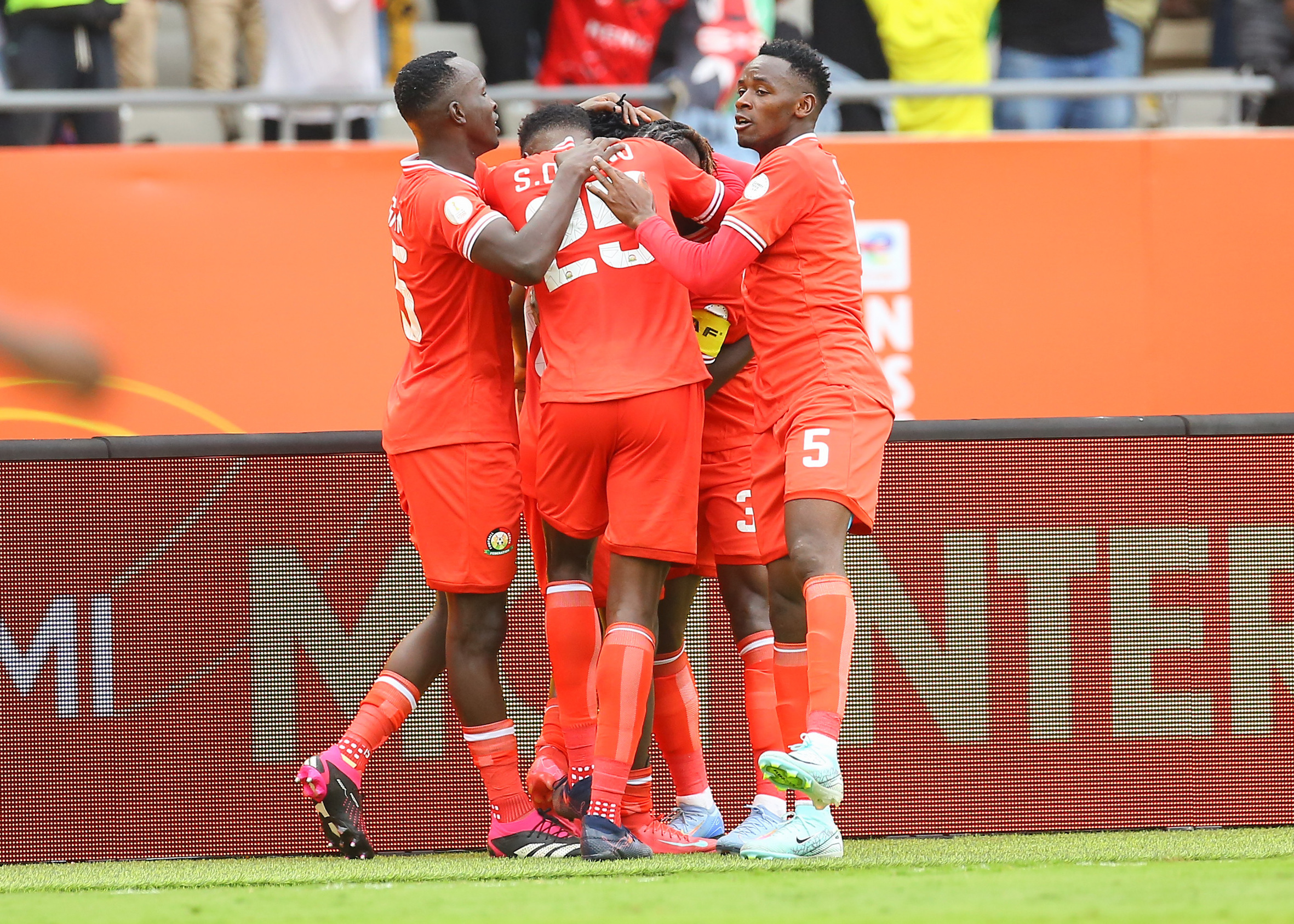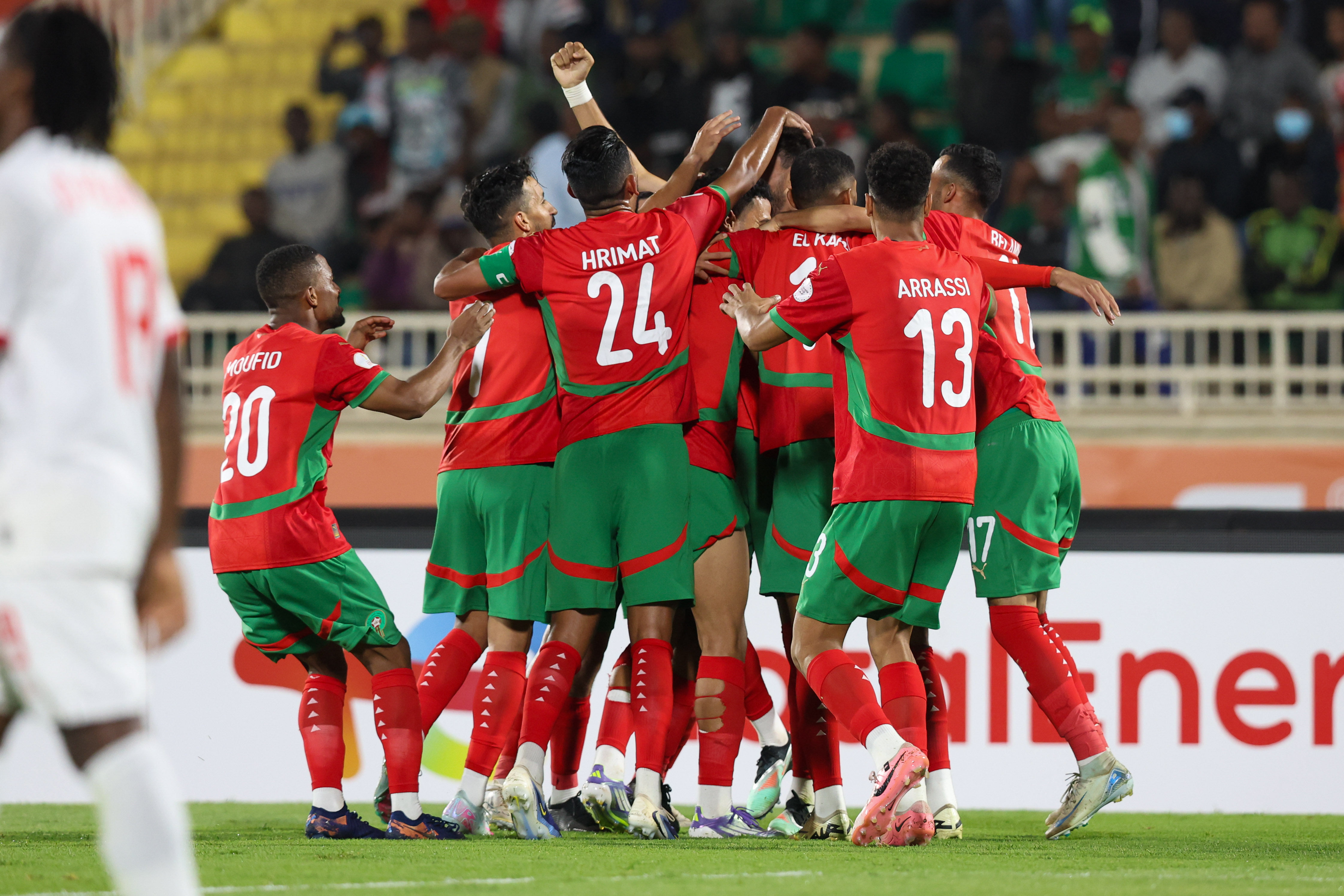
 Harambee Stars players celebrate a goal against DR Congo/HANDOUT
Harambee Stars players celebrate a goal against DR Congo/HANDOUT
There are nights when the world leans in to listen, and football becomes not a game but a sermon. August 10 promises such a night.
Beneath Nairobi’s watchful sky, under the cathedral lights of Kasarani, the soil shall tremble not from thunder, but from 48,000 pounding hearts.
Two nations, two philosophies—one bold with history, the other burning with hope—meet not for points, but for permanence.
This is where the fire of Harambee Stars meets the faith of the Atlas Lions. And only one will leave the pitch closer to the divine.
The Atlas and the Ascent
Morocco does not travel with uncertainty. They arrive wrapped in memory and conviction, cloaked in the pride of two CHAN crowns, marching like a dynasty reborn.
Their 2–0 opening victory over Angola did not scream—it hummed like machinery. Clean. Precise. Elegant. Imad Riahi’s opener was not just a goal; it was geometry in motion. The second, a gift by Angola’s faltering backline, was simply inevitable.
But amidst the quiet dominance, Rabie Hrimat was the axis around which Morocco spun their spell. With the poise of a general and the calm of a monk, he stitched Morocco’s tempo like an old tailor threading legacy into cloth.
“It’s a great way to start CHAN, and we’re determined to keep this rhythm going,” he said after the game, his tone not jubilant, but resolute. “This squad is built from the best of our domestic league. We’ve prepared well, in Morocco and here in Kenya. We are ready.”
His words were not declarations. They were quiet declarations of intent, soaked in the steel of a nation that plays not with fear, but with familiarity. For Morocco, this tournament is not about discovery—it is about coronation.
The Stars that refuse to fade
Yet from Nairobi’s beating heart rises something ancient and unshackled. Kenya has danced in the peripheries of African football for decades, always knocking, often ignored. But not this time. This time, they have kicked down the door.
Their 1–0 conquest of DR Congo was no mere upset—it was a spark in a dry forest. Austin Odhiambo’s goal was not scored. It was sculpted. A left-footed brushstroke on the canvas of CHAN. And as the net rippled, Kasarani roared—not in cheer, but in recognition. Kenya had arrived not as visitors, but as the storm.
“We were nervous at the start,” admitted head coach Benni McCarthy, with the weary grin of a man who knows too well the price of belief.
“But once the boys settled, they showed real bravery. Odhiambo’s goal came at the perfect moment—right before the break. It changed everything.”
He wasn’t just reflecting. He was unveiling. “We’ve trained for adversity. These boys have been doubted all their lives. That’s where their strength comes from—from being overlooked.”
Captain Abud Omar stood beside him, gaze unblinking, voice grounded. “This is the most united I’ve seen this team. There’s a deep brotherhood forming here—something unshakable. That win? That came from our guts, not just our tactics.”

Kasarani has become something else. No longer a stadium—it is a spiritual arena. A sold-out cathedral, where hope is sung in 10 languages and danced through narrow alleyways of Mathare and the rustling maize fields of Eldoret. “When I step out of the tunnel,” said Omar, “I don’t hear fans. I hear the voices of generations. I hear every boy who played barefoot in a muddy field and dreamed of this stage.”
On August 10, the Harambee Stars won’t just step onto grass. They’ll tread upon every heartbreak that shaped them, every whisper that said they wouldn’t make it. And the stadium will carry them like a tide.
A table taut with tension
The math is simple but cruel. Kenya and Morocco—each three points, each with a clean sheet. The winner edges toward the summit. A draw opens the gates to chaos. A loss for either could undo the miracle of their beginnings. But this is not about arithmetic. This is about breathless defiance.
Sketioui’s Sword of Strategy
Tarik Sektioui walks like a man who has mapped out the moon. Morocco’s head coach carries the air of patience, but his words cut with precision. “The second game against Kenya will not be easy,” he said, lips tight, eyes sharp. “They have good players—brave, aggressive. We must prepare like we did for Angola. With focus. With discipline.”
He added, voice low like a tide beneath a calm sea, “We must play with the same mentality, the same hunger, and discipline. We are not here for second chances—we are here to win.”
Morocco may speak softly. But make no mistake—they come with sharpened intentions.
Benni’s Fire and the Birth of Belief
If Sektioui sculpts strategy with silence, McCarthy breathes fire into shadows. He does not coach. He composes.
“This team is young, but it’s full of fighters,” he said, leaning forward, as if offering his heart into the air. “If we play without fear, there’s no team we cannot beat.”
He paused, then said slowly, “Morocco is great. But greatness doesn’t win games. Belief does. Hunger does.”
He’s not just rallying his team—he’s lighting the fuse of a nation. “This match is more than a fixture,” he said. “It’s an awakening.”
Midfield Duels and Invisible Strings
Hrimat will try to slow the heartbeat of the game, weaving Morocco’s rhythm like a conductor. But Odhiambo—fleet-footed and flame-hearted—will seek to unthread that pattern, to pull chaos into elegance. Their duel will be the silent war beneath the noise.
Defensive Vigil
Bryne Omondi stands at the gate, tall and unyielding. Against Morocco’s poetic precision, he must become stone and spirit.“Pressure is a privilege,” he said. “Let it come. I will not blink.”
Behind every save is not just reflex, but memory. Omond knows what this means. He carries the prayers of villages.
Attack unleashed
Kenya cannot ride Odhiambo’s magic alone. Boniface Muchiri's lightning. Masika’s intuition. Onyango’s cunning. It will take a chorus of courage, not a solo.
And sometimes, the hero is the one not spoken of. A late substitute. A forgotten name. Because in games like this, fate loves surprise.
Set pieces and unseen threads
Set pieces are moments where the world slows. A corner can become a revolution. A free kick can slice time. This match will be defined not just by open play, but by the margins where angels whisper.
Stars to watch
Austine Odhiambo – Kenya’s flame. Every touch is a poem. Morocco will look to douse his fire, but creativity cannot be caged.
Rabie Hrimat – The metronome. Calm in chaos. Morocco’s strategist with feet that speak silence.
The Stakes Beyond Scoreboards
This is no longer about advancing. For Morocco, victory seals their myth, pushing them toward a third CHAN crown. For Kenya, it breaks the curse. It tells the continent: we are not a story of almosts—we are Africa’s new chorus. Abud Omar said it best: “A win here would mean more than three points. It would mean we are real.”
Benni nodded in agreement. “This is no longer about who we were. It’s about who we’re becoming.”
“Let them bring their crowns,” whispered McCarthy. “We’ve brought our hearts.”
And in the stands, under twilight’s hush and thunder’s edge, 48,000 voices will believe. There will be sweat. There will be scars. There may be heartbreak.
But there will be poetry. Because in a place like Kasarani, where belief meets brilliance, and fire meets faith, football becomes more than sport. It becomes a nation’s hymn.


![[PHOTOS] Harambees Stars feel the pitch, engage fans ahead of Angola tie](/_next/image?url=https%3A%2F%2Fcdn.radioafrica.digital%2Fimage%2F2025%2F08%2Fd63c052e-58cc-4ba2-8628-e9438ef1b9e1.jpg&w=3840&q=100)










